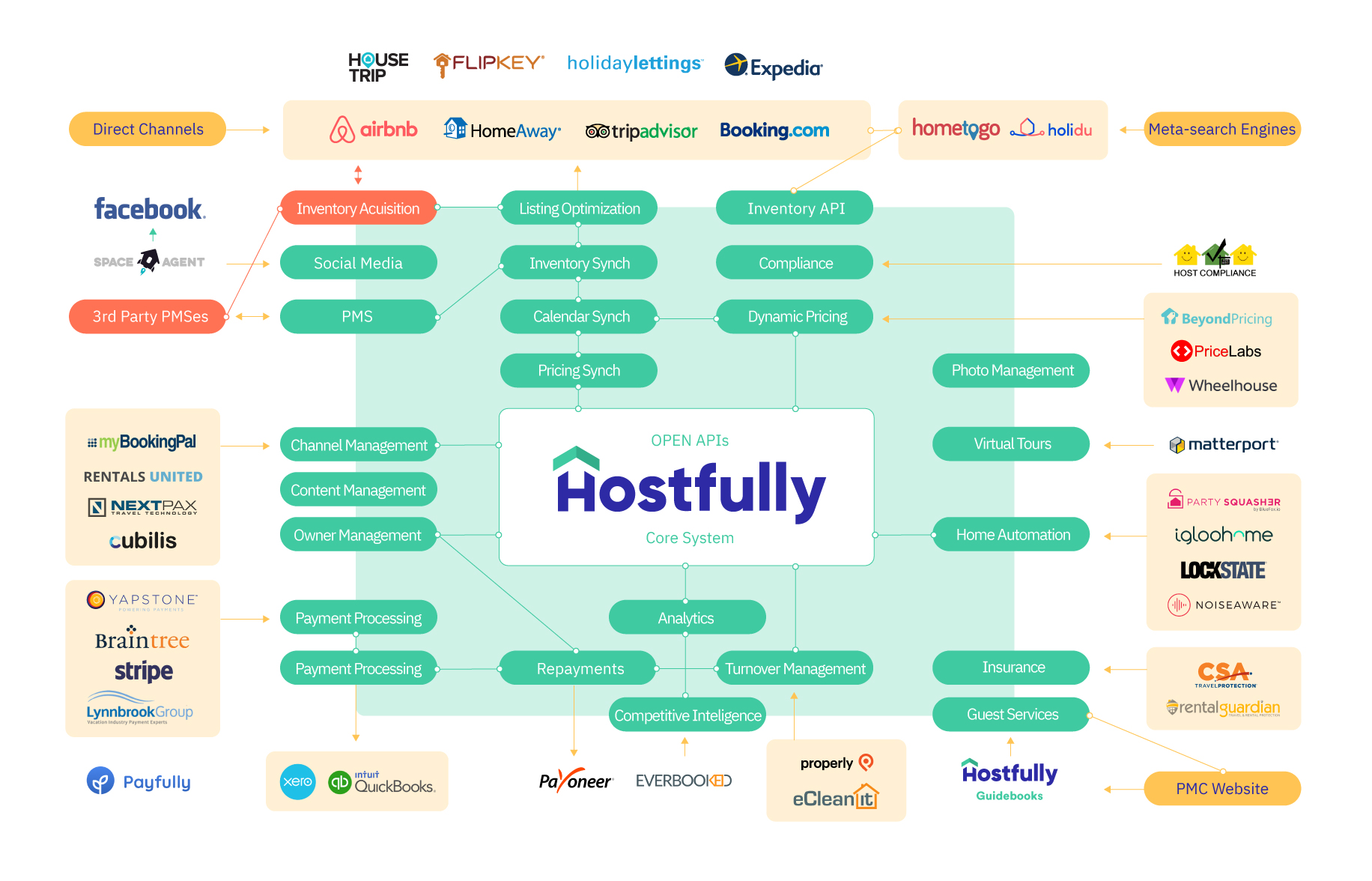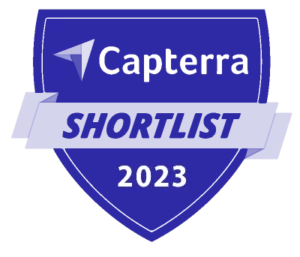Thanks to all-in-one property management platforms, vacation rental managers can manage dozens of properties across multiple channels. As industry professionals, we take this seamless connectivity for granted. But did you know that without one crucial technological advance, none of this would be ? We’re talking about application programming interface (API) – the unsung hero behind all the software we’ve become reliant on to operate and scale our vacation rental businesses.
The use of travel API technology has exploded across the tech and vacation rental industry in recent years. But what exactly is an API, how does it simplify the lives of VRMCs, and where will this technology bring us? Let’s find out.
APIs explained in under 100 words
Think of an API like a translator and each software like a language. Each application speaks in a different way, which means interactions between them can get complicated. APIs translate information into data that everyone can understand. That information can then be taken from one application and used by another.
Imagine visiting the Eiffel Tower. You want someone to take your photo, but you don’t speak French. API is like your fluent friend who asks a passing Parisian to take a snap. You get a picture without knowing a single word of French.
API allows developers to interact easily with third-party software. For example, they can embed a camera function in an app using the iPhone’s camera API without learning any of the codings behind the camera interface.
How APIs revolutionized the vacation rental industry
The story of how Airbnb disrupted the hospitality world has become an industry legend. But it was by creating an API for their distribution channel that Airbnb, one of the most revolutionary companies of recent years, opened the floodgates for a whole new wave of innovation.
Initially, Airbnb’s API wasn’t open to third parties. But once they made it accessible, third-party tech companies developing VR solutions were able to connect with Airbnb’s systems. Companies like ours could then use Airbnb’s data and make it usable by VRMCs. It’s important to note, however, that the Airbnb API didn’t just sprout channel managers and property management platforms (PMPs). It also set the stage for price adjustment algorithms, remote keyless entry solutions, automated cleaning services, and many more niche software solutions.
How did this impact VRMCs?
Airbnb’s competitors caught on to what an open API meant for their business. Hosts could now centrally manage dozens of properties and scale their business. If only Airbnb offered an API, they’d quickly gobble up the booming professional vacation rental managers’ segment of the industry. Competitors responded and created their APIs to compete. And so began the API proliferation of the other major vacation rental distribution companies (VRBO, HomeAway, Booking.com).
From that point on, VRMCs using Property Management Software (PMSs) (like Hostfully’s) could now efficiently manage dozens of properties across all the major distribution channels simultaneously. With a streamlined and time-saving tool, VRMCs didn’t have to log in to separate apps and accounts to communicate with guests or manage calendars. That simple benefit fueled the expansion of VRMC portfolios. Time and energy were the reshifted to acquiring new properties, building business processes, or improving the guest experience.
Looking past calendar and guest messaging and calendar management
API technology allowed VRMCs to manage multiple properties across different channels without breaking a sweat. It could all be done via a central system. But managing calendars and messaging guests was just the beginning. Today, the API landscape has expanded hugely. Whole new ecosystems of management solutions have emerged to improve operational efficiency and make the lives of VRMCs easier.
Applications like revenue management tools, scheduling software, accounting, and remote lock systems can all be integrated into an easy-to-use platform like Hostfully — thanks to API technology. APIs allow Hostfully to connect otherwise unconnectable systems. For example, funneling dynamic prices from Beyond Pricing to Airbnb, Booking.com, and VRBO in the blink of an eye.
Webhooks: taking it a step further
As if that wasn’t enough, webhook technology took APIs it to the next level. Webhooks allow two applications to exchange information in real-time. For example, with our webhook API, our partners can deliver data from Application A to Application B as soon as a specific event is triggered.
What does that mean for VRMCs? Here’s an example: when guests check out of the property, Airbnb or VRBO sends this data to the PMS, which triggers a webhook. The task of cleaning the property gets automatically assigned by the software that’s integrated into the PMS. Not only are the two applications able to connect, but they share data immediately and instantaneously.
APIs to manage APIs – a complicated way of simplifying the work of VRMCs
PMSs like Hostfully use API technology to make working with niche Software as a Service (SaaS) solutions more natural and efficient. Hostfully’s API-driven platform allows third-party tech businesses to create software directly on top of our open API with documentation available through the developer portal. This way, all our partner’s solutions are accessible via a single platform, making it easy for VRMCs to use external products.
Through the integration zone, VRMCs have access to all the solutions offered by partners. Here are a few examples of multiple APIs working in tandem to bring functionalities that boost efficiency and save time:
- Remote access management – Remote Lock, Virtualkey – These save VRMCs time by controlling locks from the cloud. Their API integrates with our PMS by detecting time-dependent triggers and automatically sending access permissions. VRMCs don’t have to greet guests during check-in to exchange keys. It not only saves time but boosts the guest experience.
- Dynamic price adjustments – Wheelhouse, Pricelabs, Beyond Pricing – These powerful algorithms adjust nightly rates to maximize revenue. Their APIs gather data from the distribution platforms and adjust pricing in real-time. Our API bridges the gap with some of the distribution channels and gives them the option to optimize with weekly discounts and rate multipliers. VRMCs boost revenue without the hassle of manually adjusting pricing.
- Cleaning and turnover coordination – Breezeway, VR Scheduler, eCleanit, Properly – VRMCs can use these applications to coordinate and outsource cleaning and turnover services. Event-based triggers like check-out are handled by the Hostfully API, which gives VRMCs the flexibility to automatically assign cleaning contracts. VRMCs save time coordinating cleaning services and can focus on other tasks.
A quick graphic shows just how critical APIs communicating with each other is to the day-to-day functions of a VRMC:

By providing VRMCs with tools to streamline their workflow and grow their business, Hostfully’s open API empowers you to stay ahead of the competition — and to do so from a central management hub.
How integration is helping VRMCs scale, grow and boost revenue
Most single-property hosts or small VRMCs can manually manage all the tasks of operating their business. But once their portfolio expands beyond a handful of properties, human input becomes a barrier to growth. It becomes virtually impossible to manually accomplish all the tasks a software can perform in the blink of an eye.
The sad truth is that VRMCs that spend most of their working hours coordinating cleaning services or managing basic guest communications can’t focus on optimization, new property acquisition, or handling emergencies.
2020 and onwards: how APIs will continue to change the vacation rental industry
The vacation rental industry isn’t the only one catching on the power and force-multiplying nature of APIs. It’s a phenomenon we’re noticing across the tech world. To put it into perspective, ProgrammableWeb’s API directory, a hub for API news, has added an average of 2,000 new API listings per year since January 2015.
What does this mean for the vacation rental industry? Here are two ways the boom will have an impact on your operations:
1) Open APIs
Experts predict the API landscape will become increasingly accessible as the decade progresses. Currently, the process of establishing API connectivity with a third-party company is complicated. APIs are not standardized. Developers need to customize each integration. That makes it expensive for a company to sync with another.
But the demand for more accessible APIs is growing, and most new software solutions coming out now are often “open API.” What are the advantages of opening up API technology?

What does this mean for you, the VRMC manager? Expect a more diverse marketplace of tech solutions to choose from. And when any industry expands, we always see:
- More niche products: as it becomes easier to write and integrate APIs, you’ll get more software options to choose from. So instead of a jack-of-all-trades solution that only meets parts of your requirements, you’ll find the perfect solution for your company’s needs.
- Lower prices: once APIs standardize and competitors fight for a limited pool of clients, expect to see a drop in prices for vacation rental software.
2) Smart technology
Smart home technology is continuing to develop at an incredible pace. ABI Research has predicted that about 128 million homes will get some sort of “smart” integration by the end of 2020. We can expect to see guests in the vacation rental industry become increasingly reliant on these technologies in their stays.
Currently, how smart technologies function is closely-guarded proprietary information. But just like Airbnb opened its API to the world, so will the major players. For example, Amazon recently released standard API for its popular Alexa platform. Companies like Virtual Concierge Service, have already seen the writing on the wall and pioneered voice technology interfaces for the vacation rental industry. It led to their voice-activated “guidebooks” integrating into our digital guidebook feature for vacation rental properties.
The proliferation of smart technology APIs combined with guest expectations, will push VRMCs towards smart devices. It’ll likely fuel a new niche of vacation rental solutions just to manage smart device services at scale.
Wrapping things up
APIs have transformed the vacation rental industry and continue to make life easier for VRMCs. This, in turn, means better guest experiences. Hostfully’s API-driven property management platform offers a fully-integrated service with access to a wide range of innovative tools from our partners. On top of that, it’s all managed via a central hub. Contact us to find out how Hostfully’s PMS can boost your business.









